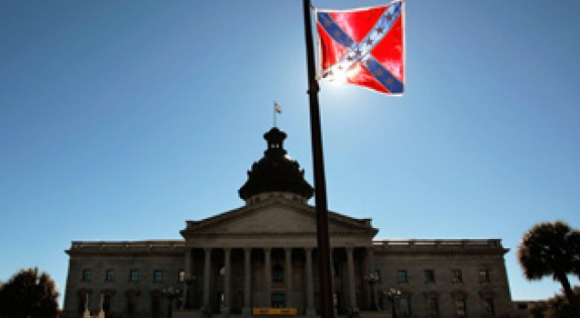aNewDomain — Inspired by the massacre of nine worshipers at a Bible study class in a historic Charleston church by a self-declared white supremacist, there now is a move afoot to remove the Confederate battle flag from the capitol building of South Carolina. It would be the last state in the Old South to do so.
The flag probably isn’t going anywhere. Most South Carolina voters, after all, opposed getting rid of the Confederate flag at the capitol as recently as last year. And, because it takes two out of three state legislators to approve the change, political analysts say the odds are stacked against the proposal to get rid of it. This is true even though Gov. Nikki Haley endorsed removing it today.
 But it should go. It should have gone in 1865, when the Confederacy was defeated. Not only is the Confederate battle flag a historic symbol of disunity, disloyalty and, arguably, treason, it is widely used and nationally recognized as a statement of racism. It symbolizes white resentment by ignorant, uneducated hicks.
But it should go. It should have gone in 1865, when the Confederacy was defeated. Not only is the Confederate battle flag a historic symbol of disunity, disloyalty and, arguably, treason, it is widely used and nationally recognized as a statement of racism. It symbolizes white resentment by ignorant, uneducated hicks.
Symbols matter. I’m white, so I can only begin to imagine how I would feel if I were a black citizen of a state where people drove around with the Confederate flag on their cars. Not to mention having to witness statues to Confederate icons, and their flag, on government property maintained and constructed with my taxes.
I know I’d take it as an insult. As it is, every time I’ve encountered the Confederate battle flag in my 51 years, none of it living in the South, it has been associated with someone stupid and mean.
If the political pressure is sufficient to result in the removal of the Confederate flag from the South Carolina state Capitol, it will be a victory for common sense.
 But no one should mistake a symbolic win for a substantial one.
But no one should mistake a symbolic win for a substantial one.
We are still living in a country where cops shoot thousands of people to death, disproportionately members of ethnic minorities. And yet cops are rarely indicted and convicted of a crime.
We are still living in a country in which one out of three African-American men can expect to go to prison at some point in their lives, often for minor crimes.
We are still living in a country in which to be black is to be poor. “In 2012, 35 percent of blacks lived in poverty, compared to 13 percent of whites,” according to The Atlantic magazine. “In 1970, those rates were 33.6 percent and 10 percent, respectively.”
In recent years, the American political class has been delivering symbolic change, not as a reflection of substantial change, but as a substitute for it.
No one epitomizes this phenomenon more clearly than U.S. President Barack Obama. In a controversial interview this week, he said:
Racism, we are not cured of it. And it’s not just a matter of it not being polite to say nigger in public … that’s not the measure of whether racism still exists or not. It’s not just a matter of overt discrimination. Societies don’t, overnight, completely erase everything that happened 200 to 300 years prior.”
That’s true. But Obama could have done much more to address systemic racism during his time in office.
Think about Pres. Lyndon Johnson, who sent federal troops to Alabama in 1965 in order to supervise a planned civil-rights march to Selma. It’s not a perfect parallel, nor can we know what LBJ would have done now, but it’s not impossible to imagine Johnson subjecting troubled local police forces like those in Ferguson and Baltimore to direct federal control in the wake of cops killing unarmed black men.
It is nearly impossible to imagine Obama taking such bold action.
The problem with race in America isn’t that there is still a lot of work to do.
The problem is, the people in charge aren’t doing much at all.
For aNewDomain, I’m Ted Rall.
Cover image: Dylann Roof Facebook photo album, showing Roof with Confederate Battle Flag













